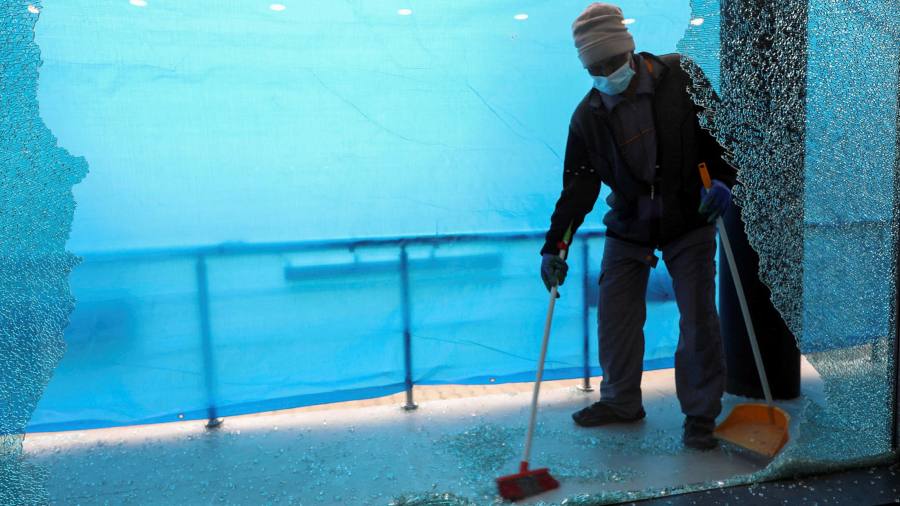[ad_1]
Few inside or outside Iraq had heard of the “Guardians of the Blood†before the militants claimed responsibility for firing a rocket barrage on the northern city of Erbil that targeted an Iraqi base hosting US troops.
The attack, which two weeks ago killed a civilian contractor and wounded an American soldier, provoked President Joe Biden’s first military act, as he ordered US fighter jets to launch strikes in Syria against Iranian-backed Iraqi militias last week.
It was an early test of how the Biden administration would respond to provocative acts by militants, while underscoring the challenges Washington faces as it seeks to re-engage with Iran over its nuclear deal and de-escalate tensions that soared during Donald Trump’s presidency.
One legacy of the hostilities between the Trump administration and Iran is the emergence of more than a dozen shadowy “resistance†groups in Iraq, such as “the Guardians of the Blood,†which have stepped up attacks against US personnel and assets over the past year.
Analysts say it is a trend that gathered momentum after the Trump administration assassinated Qassem Soleimani, Iran’s most powerful commander, and Abu Mahdi al-Muhandis, a senior Iraqi militia leader, in a US drone strike near Baghdad airport in January 2020. The declared aim of many of the groups is to avenge the deaths of Soleimani and Muhandis — heroes to Shia militias.
The groups have added a new layer of militancy that creates a more unpredictable environment in a fragile nation that hosts 2,500 US troops and where US and Iranian rivalries play out. They threaten to be a complicating factor as Biden seeks to depart from Trump’s maximum pressure campaign against Iran, reduce regional tensions and rejoin the 2015 nuclear deal with Tehran.
“It’s the raison d’être of these [Iraqi] groups to drag the US into a conflict,†said Sajad Jiyad, a Baghdad-based fellow with the Century Foundation.

Analysts suspect the Erbil attack was Tehran using its proxies to up the pressure on Washington ahead of any new diplomacy, despite the Pentagon saying it had found no evidence that Iran directed the assault.
“People assume that Biden can come and just completely change US policy in the region overnight, but he has inherited a very hot conflict and there are very different things in motion,†said Renad Mansour, an Iraqi analyst at Chatham House, which released a report on the militias last week.
He added that the emergence of shadowy groups with opaque leaderships makes it harder for the Biden administration to know who to engage with, and complicates the Iraqi government’s hopes of pursuing meaningful security reform.
The picture is muddied by the fact that the “resistance†groups are deemed to be fronts for more established Iranian-backed paramilitary forces that are deeply embedded in Iraq’s security and political structures, including the Badr Organisation, Asa’ib Ahl al-Haq and Kata’ib Hizbollah.
US defence officials said last week’s air strikes, which struck close to an Iraqi border area controlled by Iranian-aligned militias, were targeting Kata’ib Hizbollah and Kata’ib Sayyid al-Shuhada — not the group that claimed the Erbil attack.
Kata’ib Hizbollah — which Trump blamed for a rocket barrage against US forces in Iraq in December 2019 that prompted him to order the assassination of Soleimani — denied it was involved. But US defence officials said those that claim responsibility are “just front groups established to help deny attribution by the established groupsâ€.
The established movements have grown in power since they and other militias were mobilised in 2014 to counter the advance of Isis. They capitalised on their role in the territorial defeat of the jihadis to boost their popular support and extend their political ambitions.
On the security front, more than a dozen of the militias sit under the umbrella of the Popular Mobilisation Units, or Hashd al-Shaabi, a paramilitary force that has more than 100,000 personnel and received a $2.6bn budget from the government last year.
As well as attacks on US interests, the more shadowy militant groups are accused of killing and intimidating peaceful protesters, activists and critics.
Michael Knights, a fellow at the Washington Institute, said the establishment of “fronts†is a strategy developed by Soleimani, who headed Iran’s Quds Force, the overseas arm of the elite Revolutionary Guards. It gives the establishment groups “plausible deniability†so as not to damage their popular support.
“It’s a very logical part of a strategy to undermine the Iraqi state while building these groups politically,†Knights said. “These people want to have the payroll from the Hashd . . . but at the same time want to disobey the Iraqi chain of command and undertake terror attacks inside and outside of Iraq.â€
The irony, Mansour said, was that Muhandis was working to bring greater control and centralisation over the militias before the Trump administration killed him.
“The killing of Muhandis shook the precarious centralisation process in Iraq,†he said. “While many argued that he was a major player in the Iraqi government’s crackdown on protesters in 2019 and as such should be removed, the strike, like previous military action in the country, has failed to either better protect protesters . . . or enhance Washington’s interests of reducing Iranian influence.â€
He said he had spoken to fighters in “vanguard†groups, such as Kata’ib Hizbollah, which do not have a popular support base, who claimed not to know who their leaders were.Â
The challenge for Washington, Mansour added, was “this revenge is going to take yearsâ€.
“These guys will not forget the killing of Muhandis.â€
Additional reporting by Katrina Manson in Washington
[ad_2]
Source link







